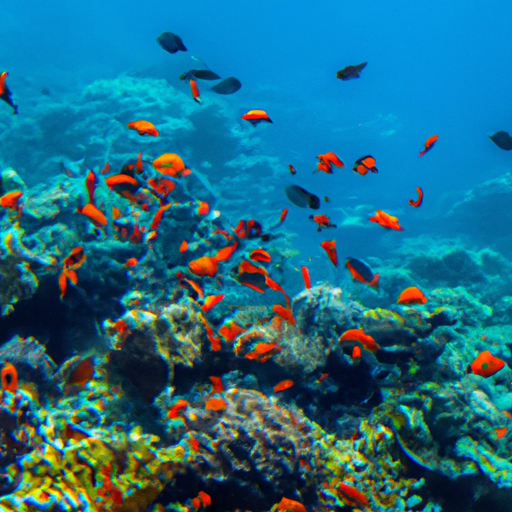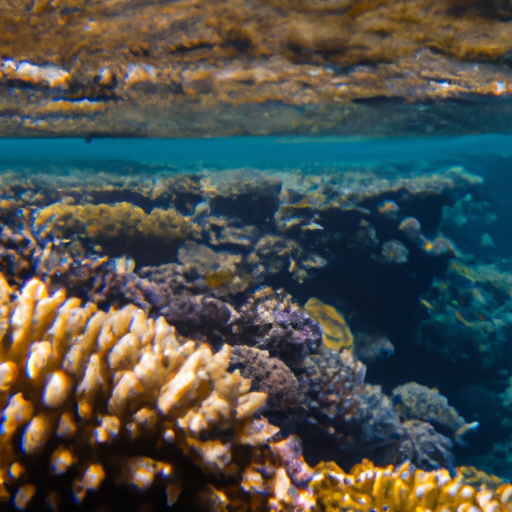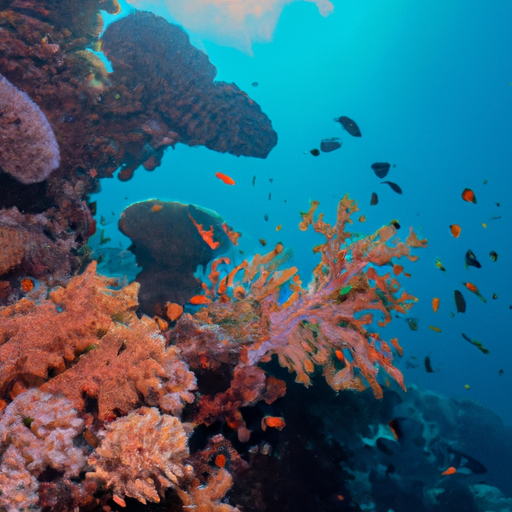
The Beauty and Diversity of Marine Life: An Underwater Exploration
Exploring the wonders of marine life is like embarking on a magical journey into an underwater paradise. The vibrant colors, the mesmerizing patterns, and the sheer diversity of marine species make it a truly enchanting experience for any diver or marine enthusiast.
Beneath the surface of the ocean lies a vast kingdom teeming with life. From the smallest of microorganisms to the largest of cetaceans, each creature plays a vital role in maintaining the delicate balance of the marine ecosystem. The abundance and variety of marine life is truly awe-inspiring, and our understanding of this realm continues to grow with each new exploration.
One of the most fascinating aspects of exploring marine life is the opportunity to encounter species that are found nowhere else on Earth. Remote coral reefs, for example, are home to a plethora of marine creatures that have evolved in isolation, resulting in unique adaptations and stunning forms. From the psychedelic patterns of the mandarinfish to the delicate beauty of the leafy sea dragon, these creatures showcase the marvels of nature’s creativity.
The abundance of marine life also extends to the open ocean, where vast schools of fish migrate across vast distances, and majestic marine mammals, such as dolphins and whales, roam freely. The sight of a humpback whale breaching or a pod of dolphins gliding through the water is truly a spectacle to behold. Being in the presence of these intelligent and powerful creatures leaves a profound impact on anyone lucky enough to witness such displays.
Exploring the wonders of marine life is not only visually stunning but also holds great scientific importance. The study of marine biology helps us understand the intricacies of the marine ecosystem and enables us to develop conservation strategies to protect this fragile environment. Through research and exploration, scientists have discovered groundbreaking phenomena, such as bioluminescence and symbiotic relationships, which continue to amaze and inspire us.
As we delve deeper into the depths of the ocean, we uncover even more mysteries and hidden treasures. The deep-sea trenches are home to bizarre creatures like anglerfish and giant tube worms, adapted to survive in extreme conditions of darkness and pressure. These creatures, although seldom seen by humans, remind us of the vastness and diversity of marine life that still awaits our discovery.
Exploring the wonders of marine life is not only a privilege but also a responsibility. With increasing threats from climate change, pollution, and overfishing, it is crucial that we strive to protect and preserve this incredible ecosystem. Through education, awareness, and sustainable practices, we can ensure that future generations will have the opportunity to marvel at the beauty and diversity of marine life, just as we do today.
Unveiling the Secrets of the Ocean: A Journey into the Depths
Exploring the wonders of marine life is an awe-inspiring adventure that allows us to uncover the secrets of the ocean depths. The vast expanse of the ocean is teeming with a myriad of unique and fascinating creatures, making it a hotbed of biodiversity. From colorful coral reefs to mysterious deep-sea creatures, there is so much to discover and learn from these aquatic ecosystems.
One of the most incredible aspects of exploring the depths of the ocean is encountering the diverse range of marine species. From tiny, vibrant nudibranchs to majestic humpback whales, each creature is perfectly adapted to its environment. Some marine organisms have evolved extraordinary features to survive in the harsh conditions, such as bioluminescence, which allows them to emit light in the darkest depths. Exploring the marine life provides us with a deeper understanding of the delicate balance of life on our planet.
Diving into the depths of the ocean also offers a unique glimpse into the interconnectedness of marine ecosystems. Coral reefs, often hailed as the rainforests of the sea, are home to a staggering array of marine species. These vibrant ecosystems not only provide shelter and food for countless organisms but also play a vital role in protecting coastlines from erosion. Carefully studying and preserving these delicate habitats is crucial for maintaining the delicate balance of our oceans.
Furthermore, exploring marine life opens the door to scientific discoveries that can have far-reaching implications. The ocean holds immense potential for medical advancements, with many marine organisms producing compounds that could be used to develop new drugs. Scientists are also studying the behavior and communication patterns of marine animals to gain insights into our own evolutionary history.
However, as we dive deeper into the depths of the ocean, we must also be mindful of the impact of human activities. Pollution, overfishing, and climate change pose significant threats to marine life and its fragile ecosystems. It is essential that we promote sustainable practices and implement conservation measures to protect the wonders of the ocean for generations to come.
Exploring the wonders of marine life is an ongoing journey that holds endless possibilities for discovery and understanding. As we continue to unveil the secrets of the ocean depths, it is our responsibility to ensure its preservation so that future generations can also experience the beauty and marvels of the underwater world.
From Coral Reefs to Deep-Sea Creatures: A Closer Look at Underwater Marvels
Exploring the wonders of marine life is like diving into a whole new world. The depths of the ocean are home to an astonishing array of creatures and ecosystems, each more fascinating than the next. From the vibrant coral reefs to the mysterious deep-sea canyons, there is a vast expanse of underwater marvels waiting to be discovered.
Coral reefs are often referred to as the rainforests of the sea, and with good reason. These delicate ecosystems are teeming with life, hosting an incredible variety of species. From colorful reef fish to graceful sea turtles and unique coral formations, these underwater gardens provide a stunning spectacle for divers and snorkelers alike.
But it’s not just the beauty of the coral reefs that captivate marine enthusiasts. The diversity of marine life extends far beyond these shallow waters. As we venture deeper into the ocean, we encounter an entirely different realm, one that is shrouded in darkness and mystery.
Descending into the deep sea, we discover extraordinary creatures that have adapted to extreme conditions. The anglerfish, with its bioluminescent lure, is just one example of the bizarre and fascinating species that inhabit these depths. The gulper eel, with its expandable jaws, and the vampire squid, with its otherworldly appearance, are other notable examples. These creatures have evolved unique characteristics that allow them to survive in a world where sunlight cannot penetrate.
Exploring the deep sea is not without its challenges. The immense pressure, lack of light, and freezing temperatures make this environment inhospitable to humans without the aid of special equipment. However, advancements in technology have made it possible for us to delve deeper into the ocean than ever before.
Robotic submersibles and remotely operated vehicles (ROVs) have allowed scientists and explorers to document and study the wonders of the deep sea. By capturing high-resolution imagery and collecting samples, researchers are gaining valuable insights into this mysterious world and its inhabitants.
Understanding marine life and the intricate ecosystems that exist underwater is crucial for conservation efforts. The knowledge we gain from exploring these wonders allows us to protect and preserve these fragile environments for future generations.
So, if you have ever wondered what lies beneath the surface of the ocean, it’s time to take a dive into the depths and explore the marvels awaiting us. The underwater world has so much to offer, from coral reefs teeming with life to the enigmatic creatures of the deep sea. It’s a journey that will leave you in awe of the incredible wonders that lie beneath the waves.
Conservation of Marine Ecosystems: Preserving the Wonders of the Sea
The world’s oceans are home to some of the most incredible and diverse ecosystems on Earth. From vibrant coral reefs to deep-sea trenches, there is an abundance of life beneath the surface of the water. Exploring these marine ecosystems not only provides a glimpse into a fascinating world but also highlights the importance of preserving and conserving these habitats.
One of the most popular ways to explore the wonders of marine life is through scuba diving. This exhilarating activity allows divers to immerse themselves in the underwater world, where they can witness firsthand the beauty and complexity of marine ecosystems. From swimming alongside colorful fish to encountering graceful sea turtles and majestic manta rays, diving offers a unique and awe-inspiring experience.
However, it is crucial for divers to understand the fragility of these ecosystems and the impact they can have on marine life. Responsible diving practices, such as maintaining proper buoyancy and avoiding contact with delicate organisms, are essential to minimize disturbance to the underwater environment. Additionally, divers should be aware of the importance of not removing or damaging any marine life, as even the smallest actions can have far-reaching consequences.
Conservation efforts play a significant role in preserving marine ecosystems for future generations. Marine protected areas (MPAs) are established to safeguard fragile habitats and promote the recovery of threatened species. These protected areas not only serve as sanctuaries for marine life but also contribute to the overall health of the oceans. By respecting MPA regulations and supporting organizations working towards their establishment and maintenance, divers can actively participate in the preservation of marine ecosystems.
Education and awareness are also key in promoting the conservation of marine ecosystems. Diving instructors and organizations can play a crucial role in educating divers about the importance of environmental stewardship. By integrating marine conservation principles into dive training programs, divers can gain a deeper understanding of the interconnectedness of marine ecosystems and the actions they can take to protect them.
Exploring the wonders of marine life through diving is a remarkable experience that allows individuals to connect with the underwater world. By embracing responsible diving practices and supporting conservation efforts, divers can contribute to the preservation of these awe-inspiring ecosystems for generations to come. Let us dive into the depths of the ocean with reverence and appreciation, ensuring the wonders of marine life continue to thrive for future explorers to marvel at.


